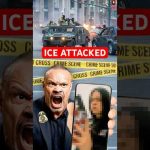In Illinois, an alarming situation has unfolded this weekend, drawing significant attention to the issue of crime and immigration enforcement. Authorities have made over a thousand arrests, targeting those accused of heinous acts like kidnapping, child abuse, and violent crimes. Among the apprehended are individuals with concerning criminal backgrounds, such as Rafael Alberto Tolantino Martinez and Pedro Aventano Andres, both alleged to be illegal immigrants with violent histories. There is also Aziz Kamal, a deportable resident facing serious charges. This roundup underscores a broader debate on immigration policy and enforcement.
The situation escalates when considering the response from local communities and political leaders. Protests erupted in Broadview, Illinois, as individuals opposed to Immigration and Customs Enforcement (ICE) activities demonstrated aggressively. Some protesters went as far as physically attacking ICE vehicles, shouting incendiary slogans and blocking roads. This raises significant questions about the balance between activism and law enforcement, as well as the safety of officers tasked with applying federal immigration laws.
Critics argue that certain political leaders, including Illinois Governor J.B. Pritzker, seem to support policies that complicate the work of ICE, thereby indirectly shielding criminals from deportation. The governor’s stance has led to accusations of prioritizing political correctness over public safety. Such accusations contend that providing sanctuary to individuals with serious criminal backgrounds poses a direct threat to community security, emphasizing the need for clear and firm immigration enforcement.
The altercation in Illinois reflects a larger, nationwide pattern of resistance against ICE, revealing a deep divide on immigration policy. Political rhetoric has intensified on both sides, with some communities seeing ICE as a symbol of oppressive policies, while others view it as an essential element in maintaining the rule of law. This tension is further exacerbated by incidents where activists actively engage in obstructing ICE operations, sometimes resorting to violence.
In the midst of these heated debates, the importance of law enforcement’s role in upholding safety must not be overshadowed. The ongoing conflict underscores the need for a rational discussion on immigration reform—one that prioritizes both humanitarian concerns and the rule of law. As this unfolds, it remains crucial for lawmakers and communities to address the complexities at the heart of immigration issues and strive for solutions that safeguard both American values and community security.




